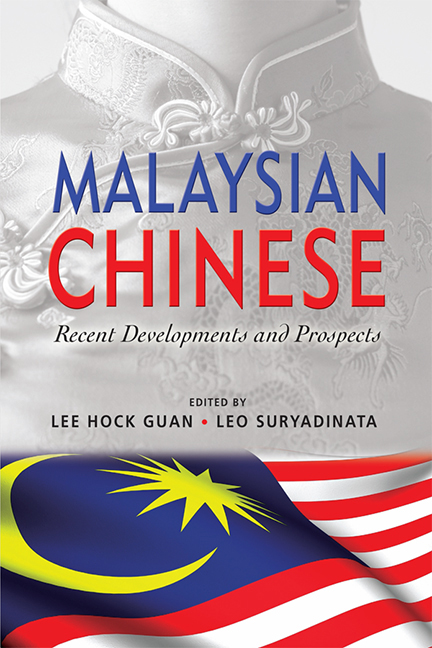Book contents
- Frontmatter
- Contents
- Preface
- Contributors
- Glossary
- Introduction
- 1 Malaysia: Ethnicity, Nationalism, and Nation Building
- 2 Being Muslim and Chinese in Malaysia
- 3 Quo Vadis: The Chinese in Malaysia
- 4 At a Crossroads: Malaysia's Coalition Politics and Chinese-based Political Parties
- 5 The End of Chinese Malaysians’ Political Division? The March 8 Political Tsunami and Chinese Politics in Penang, Selangor, and Perak
- 6 Forced to the Periphery: Recent Chinese Politics in East Malaysia
- 7 The New Malaysian Economic Agenda: Some Preliminary Observations
- 8 The Old And New Malaysian Chinese Language Press, with Special Reference to the 12th General Election
- 9 Education of the Chinese in Malaysia
- Index
5 - The End of Chinese Malaysians’ Political Division? The March 8 Political Tsunami and Chinese Politics in Penang, Selangor, and Perak
Published online by Cambridge University Press: 21 October 2015
- Frontmatter
- Contents
- Preface
- Contributors
- Glossary
- Introduction
- 1 Malaysia: Ethnicity, Nationalism, and Nation Building
- 2 Being Muslim and Chinese in Malaysia
- 3 Quo Vadis: The Chinese in Malaysia
- 4 At a Crossroads: Malaysia's Coalition Politics and Chinese-based Political Parties
- 5 The End of Chinese Malaysians’ Political Division? The March 8 Political Tsunami and Chinese Politics in Penang, Selangor, and Perak
- 6 Forced to the Periphery: Recent Chinese Politics in East Malaysia
- 7 The New Malaysian Economic Agenda: Some Preliminary Observations
- 8 The Old And New Malaysian Chinese Language Press, with Special Reference to the 12th General Election
- 9 Education of the Chinese in Malaysia
- Index
Summary
INTRODUCTION
For many Chinese Malaysians, a major concern in Chinese politics is the problem of “political division” in the community. Since 1959, Chinese electoral politics in West Malaysia has been characterized by fragmentation, with Chinese voters splitting their support between the ruling coalition, the Alliance, and later the National Front (Barisan Nasional, BN), and the opposition parties. To further complicate matters, even the two camps were severely fragmented; before 1969 the anti-establishment Chinese votes were divided by several leftist parties, and after 1969 the Malaysian Chinese Association (MCA) and the Chinese-dominant Parti Gerakan Malaysia (Gerakan) competed to represent the Chinese voters in the BN government. This political division has commonly been blamed for the erosion of the so-called “community interests” as the Chinese-based parties could not get their act together amidst the implementation of pro-Malay or pro-Bumiputra policies in economic, sociocultural, and political fields.
In sharp contrast, with the exception of the 1969 general election, the majority of ethnic Malay voters had always backed a single party, the United Malays National Organization (UMNO), as the driving force of national politics, not withstanding the significant presence of its long-term rival the Pan-Malaysia Islamic Party (PAS). In return for the community's support, UMNO has implemented many pro-Malay policies since winning the 1955 Home Rule election. From a communal perspective, the ethnic Malays’ political unity in multi-ethnic Malaysia is extremely effective and rewarding, and many would attribute that to the group's political unity. In the paradigm of the ethnic zero-sum game, where monopartism is inevitably superior to multipartism for an ethnic group, the Chinese Malaysians have failed miserably, given their political division.
The March 8 election in 2008 have reversed the configuration of ethnic politics in Malaysia. It was “the day Malaysia woke up” (Kee 2008) because it was in a profound sense “eclipsing May 13” (Ooi, Saravanamuttu and Lee 2008). This chapter will focus on how the post-1969 Chinese politics in West Malaysia has been transformed. From the previous pattern of “United Malays v Divided Chinese”, Malaysian ethnic politics has shifted towards a new “Divided Malays v United Chinese” format.
- Type
- Chapter
- Information
- Malaysian ChineseRecent Developments and Prospects, pp. 86 - 108Publisher: ISEAS–Yusof Ishak InstitutePrint publication year: 2011



